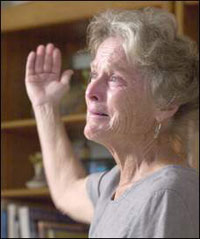|
Faith Fippinger, 'Human Shield ' back home by Jan Friday May 09, 2003 at 09:52 PM |
| jan@steun.be |
"With no medical training" Fippinger said "she did what she could. She carried amputated limbs to a pile for later disposal. She carried dead babies to a truck, to be taken somewhere for burial. She watched as parents sorted through the growing piles of children's bodies, searching for their sons and daughters". Fippinger said she held some of the injured, soothing them. "It's nothing new. It's happened in every war," she said. "But the amputees, the dead babies, the dead adults, people without limbs, people without eyes …"

faith_fippinger_back_home.jpg, image/jpeg, 200x239
-----------------------------------------------------------
'Human shield' returns from Iraq, by Tom Bayles - 8/05/03 -tom.bayles@heraldtribune.com
-----------------------------------------------------------
SARASOTA -- It's not the whistle of the missiles or the boom of endless explosions that Faith Fippinger remembers most from her three months as a "human shield" in Iraq. It's the week she spent working in a Baghdad hospital that could haunt her forever. "I may never stop crying again for the rest of my life," said Fippinger, 62, at her Sarasota home Wednesday.
Fippinger traveled to the Duarra oil refinery eight miles southeast of Baghdad in mid-February to protest a war she felt was unjust. To her, no war is just. She and other human shields put themselves in harm's way in the hope that their presence would deter military action.
She chose the Duarra plant because it was bombed during the first Gulf War, and because it provides power to schools and hospitals. Fippinger, a retired teacher, thought she might help at the school.
Residents of the 400-home complex within the refinery welcomed her. One family gave her a place to sleep and food. Children gave her hugs. "The first word out of their mouths when you said you were an American was 'welcome.'"
The bombs started dropping March 20. "You heard the whistle. The explosions. The shattering," she said. "We had our windows taped, but the whole house shook. It went on, and on, and on." Her concrete house never took a direct hit, but she saw bombs blow up neighborhoods, buses and people. "The ones who were killed instantly, it took them hours to pick up all the bits and pieces," she said. A missile hit the refinery one night and a fire erupted, but it was quickly put out. Schools remained closed throughout the war, so in April, after the bombing slowed, Fippinger went to a nearby hospital to help.
Hundreds of civilian casualties would come in at once, overloading the few doctors left on staff, she said. Medical supplies were scarce or nonexistent. Everywhere, she saw people crying over lost wives, husbands, children.
With no medical training, Fippinger said, she did what she could. She carried amputated limbs to a pile for later disposal. She carried dead babies to a truck, to be taken somewhere for burial. She watched as parents sorted through the growing piles of children's bodies, searching for their sons and daughters.
Fippinger said she held some of the injured, soothing them.
"It's nothing new. It's happened in every war," she said. "But the amputees, the dead babies, the dead adults, people without limbs, people without eyes …"
The Knight-Ridder news service reported this week that there were at least 1,101 civilian casualties in Baghdad during the war, according to hospital records. The same records indicated that another 1,255 dead were "probably civilian," the news service said.
Fippinger told of a man at the hospital who was standing by his dying wife, tears streaming down his face. He told Fippinger his six children were killed by the same bomb that claimed his wife.
Fippinger, who returned from Iraq on Saturday, said she knows some Americans despise her. She knows she's been called a traitor. She said U.S. government officials warned her before war broke out that if she stayed, and lived, she could be tried for treason.
And after she got home, she received a letter from the government warning that she could be jailed for 12 years and fined $1 million if she worked for Saddam Hussein's regime while in Baghdad. She must fill out a questionnaire detailing what she did in Iraq, and wait to see if she's arrested.
"It's a possibility," Fippinger said. "But if that happens that's just more confirmation to me that we need to be aware of what's happening in our democracy."
She insists her time in Iraq was spent on behalf of the people, not the leadership. Fippinger said she went to Iraq as a human shield to send a message that war is not the answer. "This had nothing to do with Saddam Hussein, because certainly he was evil," she said. Fippinger said she knew of about 300 human shields who went to Iraq from dozens of countries. If there had been a few thousand, she feels, the concept might have worked.
Fippinger's Sarasota family did not hear from her during the war. "I was constantly watching the news and getting information from the Internet," said her brother, John Fippinger. "I was worried every day." When U.S. tanks and soldiers began streaming through the oil refinery and the streets of Baghdad, Fippinger knew it was time to leave.
She called her brother last week from Amman, Jordan, and said she was coming home. He picked her up at Tampa's airport on Saturday night.
Now, Faith Fippinger says she needs quiet time to let the horrors of war fade, if that's possible. She'll read. She'll spend time in the garden. She'll talk with friends. Someday, she said, she'll go back to Baghdad to help with the reconstruction. She'll check on her friends at the oil refinery and look in on the teachers at the school -- and perhaps visit the hospital.
-------------------------------
http://www.newscoast.com/
-------------------------------
